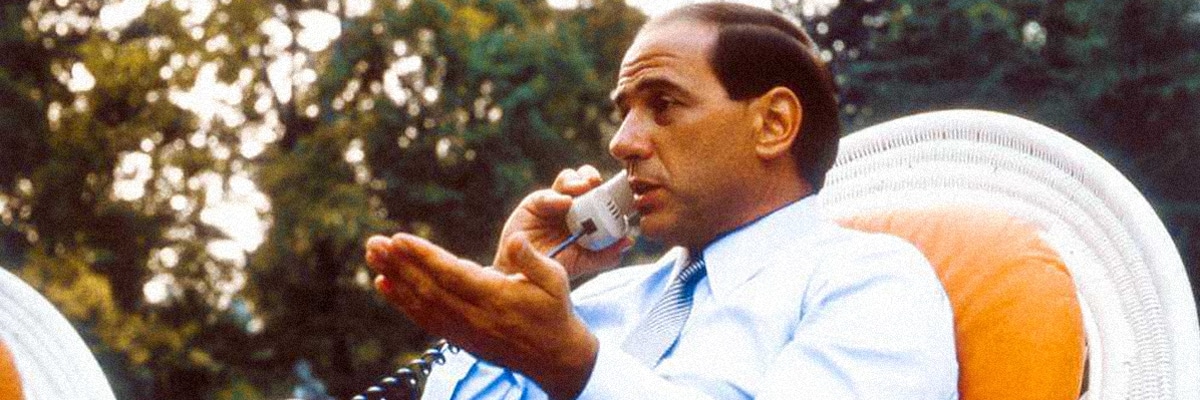Monday 12th June, a date we will always remember. A symbolic date that marks the end of an era, as much political as it is a watershed for the history of Italy. It will be difficult to forget the instant when each of us learnt the news of Silvio Berlusconi's death, the thoughts and actions that ran through our lives crystallised in that brief moment when the whole of Italy stood still.
The 'Cavaliere' was many things. A housing developer, builder and innovator. A mass media revolutionary who transformed Italian television and communication. A brilliant manager of the Italian football team AC Milan first and of Monza later, bringing it to the prominence in Serie A. A true business tycoon. A charismatic politician, the one who managed to bring the political Right back to the government of the country for the first time since the end of fascism. His appearance on the scene was able to unblock a system incapable of expressing regular mechanisms of alternation between government and opposition, the result of unstable and ineffective alliances. This is why even the harshest critics of the Berlusconi era have welcomed in positive terms the return to a basically bipolar model that has allowed, albeit in a cumbersome manner, a physiological alternation of government between center-right and centre-left coalitions for about twenty years. Silvio Berlusconi was able to intercept the change and sell it as much to others as to himself, as Maurizio Belpietro headlines today in La Verità.
Narratives were his speciality. Through them he was able to enchant his interlocutors, making them dream the dream he himself was living. It is also for these reasons that we can remember him as a skilful seducer, focused on conquering, sometimes brazenly, anyone he encountered on his path. He first conquered the Italians in that far-off 1994, with 43% of the vote. Then it was the turn of politicians all over the world, acting with flair on the international political scene and bringing dignity back to Italy by defending the national interest.
However, the leader of Forza Italia has also been a man engulfed by scandals , first judicial and then personal. His right-hand man was sentenced in 2004 to 9 years in prison for external complicity in mafia association, a sentence that was reduced to 7 years on appeal and then overturned by the highest court. Charges and indictments followed involving him personally, 36 prosecutions to be exact, only one of which he was found guilty of tax fraud. A conviction that marked his life and political career. It forced him to apply for probation to social services for a period of 10 and a half months, minus the early release discount, and to face painful disqualification from his role as a senator, as well as incompatibility with political offices until his rehabilitation in 2018. Despite the difficulties he faced, he returned with determination and courage to the public scene in the last legislature, always with a smile and a hint of self-mockery. A definitely complex figure, his, made up of lights and shadows, all to be considered in order to trace the profile of a man, a businessman and a distinguished politician.
However, Berlusconi was also something other. Perhaps it is precisely this 'other' that makes him so memorable in our eyes and allows us to reflect on his legacy. It is interesting to note how a few days after his death, Berlusconi's name does not stop arousing a range of emotions and reactions. The public debate is flooded with reminiscences, tears or animosity. These emotions are the result of a long and complex political history involving many people, each of whom interpreted and experienced the Age of Berlusconi differently.
Wisely taking up the concept expressed by Gian Piero Alloisio, quoted by the Corriere della Sera in 2001 and erroneously attributed to Giorgio Gaber, we will confront not so much "Berlusconi in himself" as "Berlusconi in myself". This quotation highlights the fact that this Italian man has become an abstract symbol, a mirror through which each of us has defined ourselves, either by identification or opposition. We have dealt with his figure every day, admiring, attacking, dreaming of or mocking him. In this way, Berlusconi finished defining ourselves, helping to influence and construct our identity by similarity or contrast.
After all, we are what we made and what we left behind. Berlusconi's greatest legacy is therefore the emotions he was able to arouse. These reflect the complex and ambivalent relationship that the Italian people had with him; they are now an integral part of our collective and individual identity, and there is no single or definitive answer as to how to interpret them. We must be aware that each other's actions can have a significant impact on building or rediscovering our identity.
Berlusconi has shaped our country and we as Italians. It is now crucial to admit this, for a better understanding of Italy's past and political future. So ask yourself, who are we without Silvio Berlusconi?
Communication manager of the Centro Studi Machiavelli. A graduate in International Relations, she is currently pursuing a second degree in Political Science, International Security and Public Communication.









Scrivi un commento